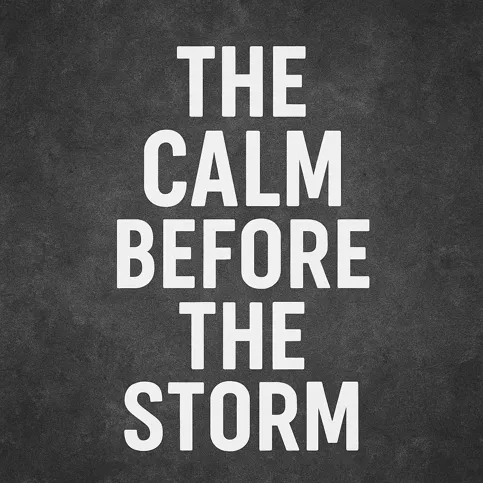What is the meaning of the phrase ‘the calm before the storm’?
A quiet, tranquil, or peaceful period of time just before a time of great activity, argument or difficulty. (This can be literal or metaphorical.)
What is the origin of the phrase ‘the calm before the storm’?
The phrase ‘the calm before the storm’ dates back to early modern English, but didn’t establish itself as a well known saying until the final decades of the 1700s. The term’s first known use is found in the early 17th-century play, The Dumb Knight, in which a character exclaims, ‘… but hush, no words; there is calm before the tempest.’ A tempest is a strong storm, and the idiom took hold through the 1700 and 1800s until tempest was replaced by ‘storm’ In the first half of the 20th century, there were over 1300 uses of the phrase, but this declined after the Second World War.
The saying was originally meant in the literal sense, spoken by sailors about how calm the weather and sailing conditions become just before a storm rolls in. During the calm, the wind dies down, birds stop chirping, the air sometimes feels heavy, and the tides start to subside.
It wasn’t long after the first recorded use of the phrase that the phrase was also used in a figurative way, as a metaphor for any situation or circumstance in which the is a period of peace and tranquillity just before a mad rush of activity or difficulty or challenge of some kind.
What are some notable uses of the phrase ‘the calm before the storm’?
In news reports during Hurricane Katrina which took place in 2005, the phrase “calm before the storm” was frequently used to describe the quiet before the hurricane devastated the Gulf Coast.
The phrase has been used frequently in political contexts. For example, during the prelude to major global conflicts, such as World War I and World War II, many commentators used the idiom to describe the seeming peace and prosperity of the pre-war years before the outbreak of violence.
In Moby Dick, published in 1851, the author, Herman Melville, uses a literary portrayal of a “calm before the storm” during the sailors’ journey before their intense encounter with the titular whale. The moment of tranquillity on the sea is contrasted with the fierce confrontation that follows.
Much more recently, the pop-punk band Fall Out Boy released a song titled Calm Before the Storm in 2003 on their debut album Take This to Your Grave. The song uses the phrase as a metaphor for emotional buildup and personal turmoil before a dramatic climax in relationships, mirroring the common usage of the idiom.

